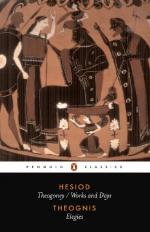|
This section contains 4,699 words (approx. 16 pages at 300 words per page) |

|
Dictionary of Literary Biography on Hesiod
It was a Boeotian peasant of the eighth century B.C. who wrote the earliest surviving systematic account of the gods of the Greeks -- the Theogony -- as well as the only surviving archaic Greek poem on farming -- the Works and Days. This is the received opinion, improbable and folkloric though it might appear to be, going back at least to Hellenistic Alexandria and repeated with appropriate qualifications and evasive gestures ever since. This Boeotian poet called himself "Hesiod," a name unique to him, one that may be etymologized "he who emits the voice," according to Gregory Nagy. As such, the name looks more like an honorific and descriptive epithet than a given name in the usual sense. A wide range of poems beyond the Theogony and the Works and Days was attributed in antiquity to Hesiod, but in fact there is little reason to think...
|
This section contains 4,699 words (approx. 16 pages at 300 words per page) |

|


